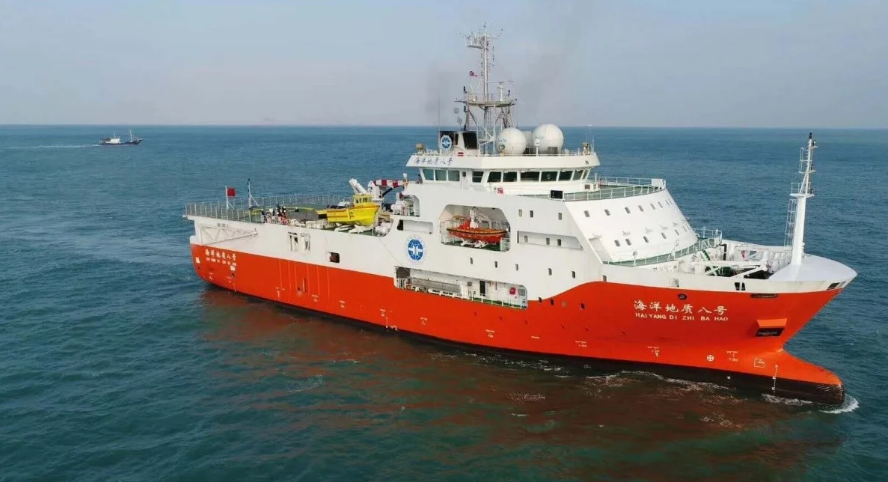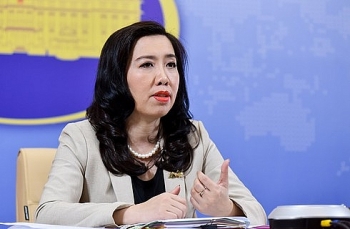SCMP: China moves to strengthen grip over East Sea with new administrative units
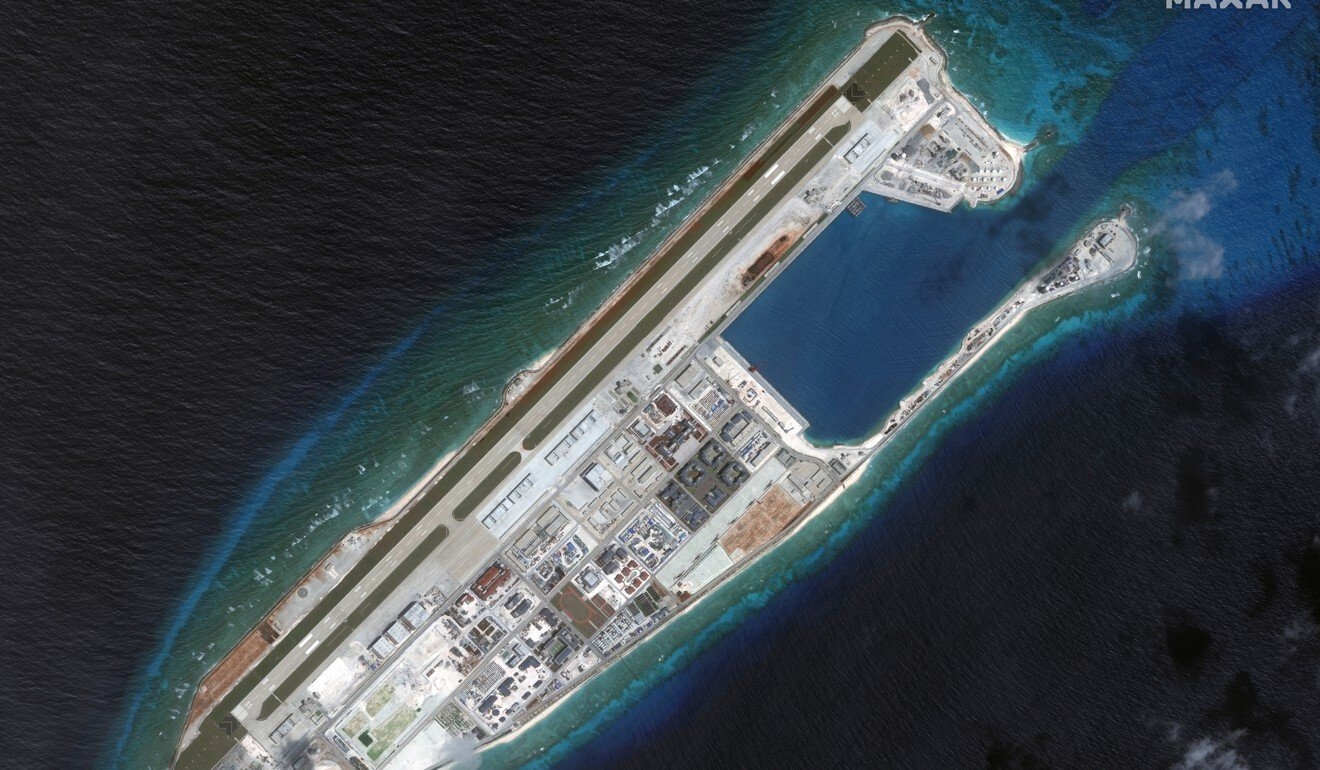 |
| Fiery Cross Reef in the Spratly Islands. The Fiery Cross Reef is one of the seven marine features in Vietnam’s Spratly archipelago where China has illegally built artificial islands and constructed various civilian and military structures. Photo: Maxar Technologies via AP |
Using the Chinese names for the Paracel and Spratly Islands respectively, the Chinese Ministry of Civil Affairs announced on April 18: “The State Council has recently approved the establishment of the Xisha and Nansha districts under Sansha city.”
According to the notice, the Xisha administration will be based in Woody Island, also known as Yongxing Island. Meanwhile, the Nansha administration will be placed in the Fiery Cross Reef, referred to as Yongshu Reef in Chinese.
The announcement came the same day the US State Department said it was concerned by reports of China’s “provocative actions” aimed at offshore oil and gas developments in the East Sea (internationally known as the South China Sea).
The vessel Haiyang Dizhi 8 (Marine Geology 8) was earlier this week spotted off Vietnam, where it had last year conducted suspected oil exploration surveys in large expanses of Vietnam's exclusive economic zone. Three regional security sources told Reuters on April 17 that a Chinese government survey ship was tagging an exploration vessel operated by Malaysia's state oil company Petronas in those waters.
"The United States is concerned by reports of China's repeated provocative actions aimed at the offshore oil and gas development of other claimant states," the US State Department said in an emailed statement in response to questions on the Haiyang Dizhi 8's presence in Malaysian waters.
"In this instance, (China) should cease its bullying behavior and refrain from engaging in this type of provocative and destabilizing activity," it said.
Earlier in the week, when the survey ship was off Vietnam, a Chinese foreign ministry spokesman had said it was conducting normal activities and said the US complaints were smears.
The presence of the Haiyang Dizhi 8 in Vietnam’s EEZ comes after China’s sinking of Vietnamese fishermen’s boat with eight crew members onboard on April 4 off the waters of Hoang Sa (Paracel) islands, an incident not only drew sharp criticism from Vietnam, but also earned condemnation from the US and the Philippines, who is also a territory claimant in the resource-rich seas, as well as international experts.
China said the Vietnamese boat had been fishing illegally and sunk after ramming the Chinese vessel, SCMP said.
Extend its control
Kang Lin, a deputy director of China’s National Institute for South China Sea Studies, said the move to establish the administrations had been expected and said the country was “under international pressure to increase its presence”.
He said: “As the artificial islands and essential infrastructure in the area are now well in place, it is now the right time to make administrative control in the area more effective.
“Meanwhile, there have been continuous scuffles with foreign powers in the waters nearly every month. China sees the need to step up its claim of sovereignty over its territory,” he said, noting the frequent patrols by the US Navy.
Kang, who works at China’s only state-backed research institution dedicated to research in the disputed waters, said the new administrations meant more manpower and resources would be dedicated to the management of the islands. Departments dedicated to finance and natural resources management are also expected to be set up.
“The administrations can serve as a frontline buffer to immediately deal with any kinds of problems related to the area,” Kang said.
“While the military presence and related build-up activities in the area does not fall into the administration of the local government, obviously there will be better cooperation between the government and such actions with the formation of administrations.”
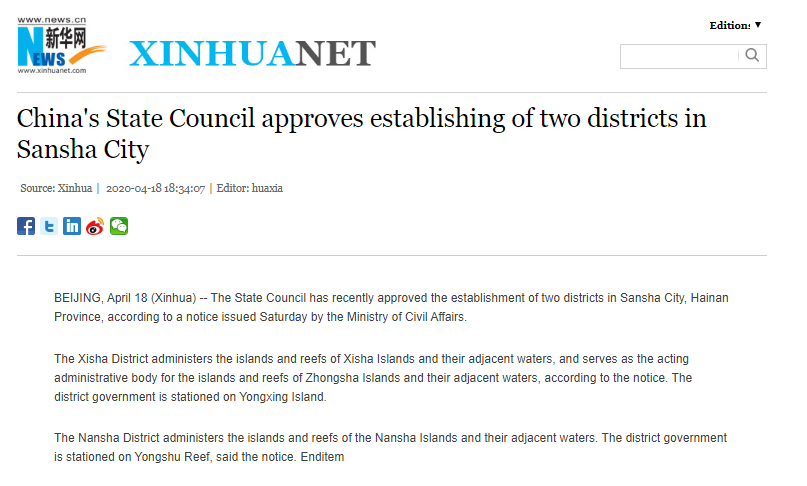 |
| China's Xinhua News Agency reports the notice from the Chinese Ministry of Civil Affairs. |
Collin Koh, a research fellow from the S Rajaratnam School of International Studies at Singapore’s Nanyang Technological University, said the move signalled that Beijing was likely to build more infrastructure and enhance its military presence in the area.
“This move also comes amid the ongoing negotiations on the code of conduct [governing behaviour in the disputed waters],” Koh said.
“It’s clear that Beijing is seeking to further consolidate its gains in the South China Sea before the code ever gets promulgated.
“Even if no code materialises eventually, Beijing would be in a much stronger physical position in the SCS.”
During an interview with the Vietnam News Agency in early this month, Dr. Gerhard Will, a German expert on the East Sea, has said that China should quit its militarisation in the East Sea and show its willingness and cooperation capacity in security and economy on the basis of equality and the observance of international law.
A former expert of Germany’s Science and Politics Foundation (SWP), he also stressed the significance of building a Code of Conduct in the East Sea (COC), saying negotiations on the document play an important role in settling the East Sea issues.
One of the conditions to completely address the disputes is trust between relevant sides, he said, adding this would make international law-based negotiations a success.
The expert said the Permanent Court of Arbitration (PCA)’s ruling in the case filed by the Philippines is an important international document that clearly points out the illegality of China’s so called “nine-dash line.”
Talks between China and the Association of Southeast Asian Nations (ASEAN) about the COC are ongoing, with the two sides being committed to finalising it by next year, SCMP stressed.
But progress has been slow since a draft agreement was presented in August 2018.
Beijing has refused to make the code legally binding, while other countries worry it will not help to resolve disputes in the region.
| The Permanent Court of Arbitration (PCA), which was constituted under Annex VII to the UN Convention on the Law of the Sea in The Hague, Netherlands, in 2016 rejected China’s territorial claims in the East Sea known as the nine-dash line. The PCA ruled against China’s nine-dash line claims and said China has no legal foundation for its claims, which overrun its rights as specified in the UN Convention on the Law of the Sea. The PCA said no maritime feature in the Spratly Archipelago is able to create an exclusive economic zone for China. The ruling accused China of causing irreparable damage to the coral reef in the Spratly Archipelago The PCA’s ruling on the legal status of a number of islands in the Spratly archipelago based on Article 121 of the UN Convention on the Law of the Sea (UNCLOS) also rejects China’s vague claim of sovereignty over certain entities in the Spratlys. The PCA ruled that entities, including Mischief Reef, Subi Reef, Gaven Reef, Fiery Cross Reef, Hugh Reef, and the Second Thomas Shoal are not islands so they are not entitled to a 200 nautical mile sea area under UNCLOS. This is the first time that Article 121 of the UNCLOS has been explained and clarified, VOV highlighted. |
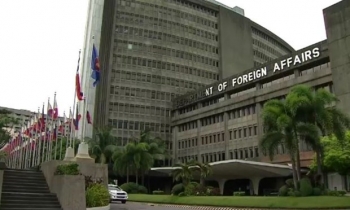 | Philippines issues statement on China's sinking of Vietnamese fishing ship in East Sea The Philippine Department of Foreign Affairs (DFA) on April 8 issued a statement expressing its deep concern over a China coast guard ship’s hitting and ... |
 | Russian experts claim Vietnam not alone in East Sea issue Russian researchers studying the East Sea issues have opposed Chinese coast guard ship’s hitting and sinking of Vietnamese fishing vessel QNg 90617 TS in the ... |
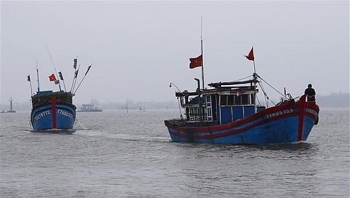 | US seriously concerned over East Sea situation after Vietnamese ship sunk by China The United States condemns China's reported sinking of a Vietnamese fishing vessel on April 2, appalling that China is exploiting the world’s focus on addressing ... |
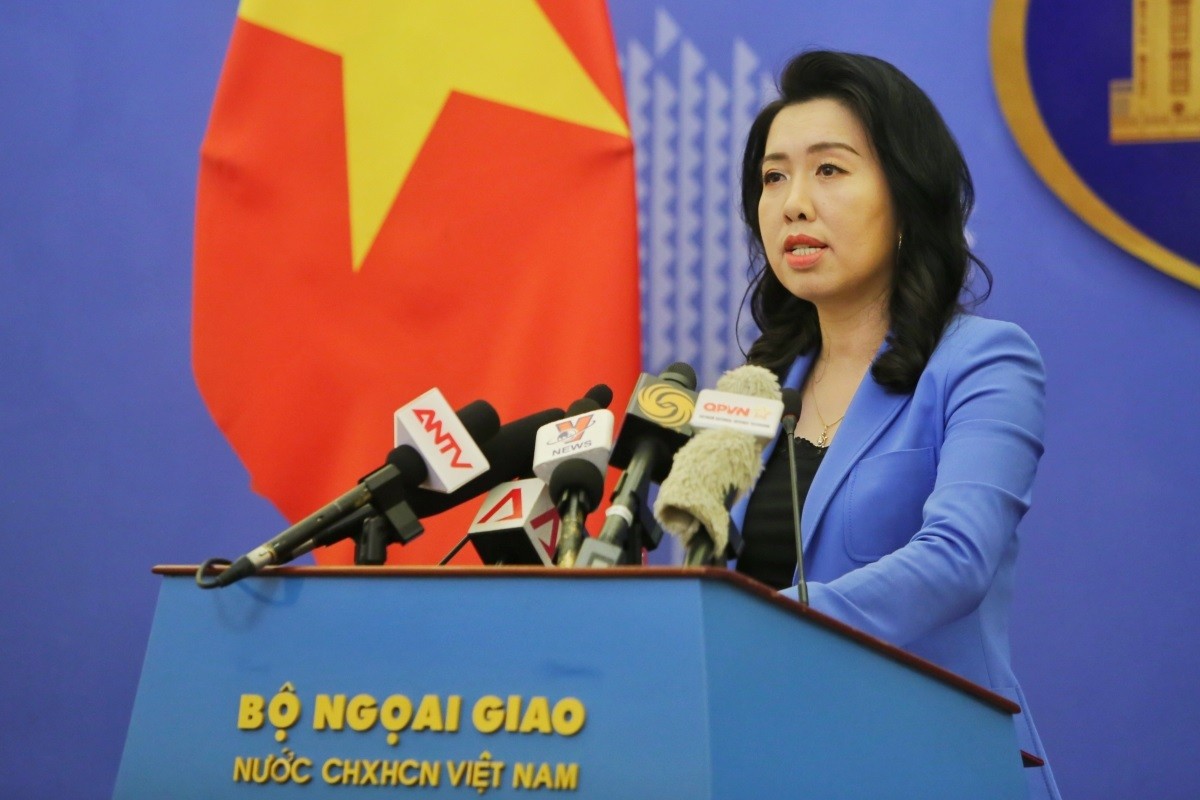 Seas and islands
Seas and islands
Vietnam Demands China Respect The Country's Sovereignty in East Sea
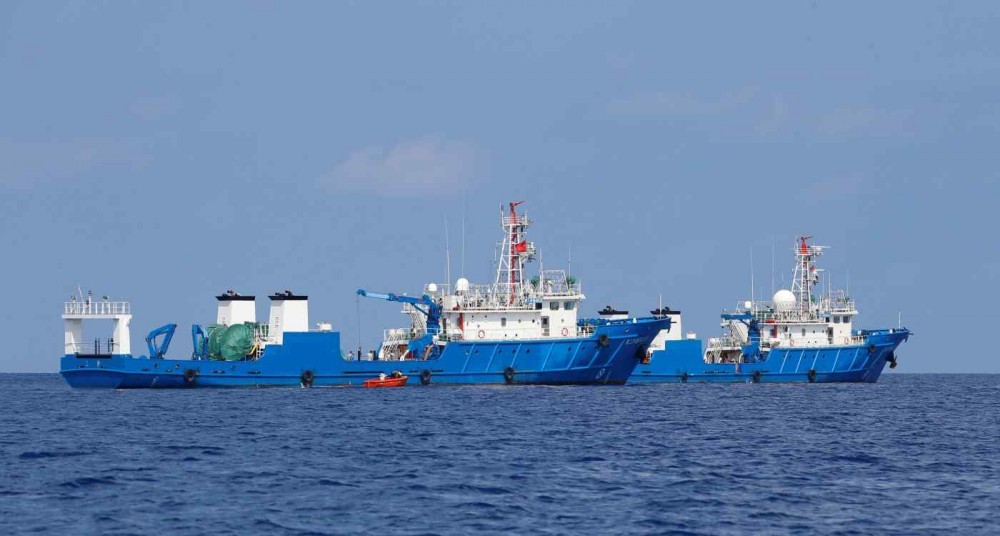 Focus
Focus
Promoting Substantive And Effective Code of Conduct in The South China Sea
Recommended
 World
World
Pakistan NCRC report explores emerging child rights issues
 World
World
"India has right to defend herself against terror," says German Foreign Minister, endorses Op Sindoor
 World
World
‘We stand with India’: Japan, UAE back New Delhi over its global outreach against terror
 World
World
'Action Was Entirely Justifiable': Former US NSA John Bolton Backs India's Right After Pahalgam Attack
 World
World
Nifty, Sensex jumped more than 2% in opening as India-Pakistan tensions ease
 World
World
Easing of US-China Tariffs: Markets React Positively, Experts Remain Cautious
 World
World
India strikes back at terrorists with Operation Sindoor
 World
World

